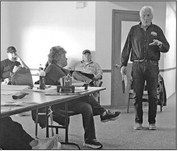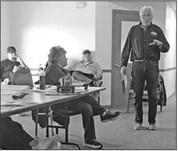Dorchester takes aim at unsafe properties


Dorchester’s village board approved four motions Monday night aimed at cleaning up a trio of properties in the downtown area that have long been considered eyesores or safety hazards.
First, the board tentatively approved a raze order for an attached garage and a lean-to structure on the north side of the house at 128 S. Second St., which is owned by Terry Recore.
Once the order is reviewed by the village attorney, it will be delivered to Recore, giving him 30 days to “demolish and remove” the structures and restore the site to original conditions.
On the advice of building inspector Bob Christensen, the board also voted to give Recore 30 days to clean up the property at 128 S. Second St., which has several items scattered throughout the yard.
The house on Second Street is one of three properties owned (or previously owned) by Recore (or one of his family members) that have created headaches for local officials.
Trustee Daniella Schauer said the board has struggled for the last 10 years to get Recore to clean up several properties in the center of the village.
The board also authorized police chief Gary Leichtman to seek a court order allowing the village to inspect an empty building at 119 Front St., which has a failing roof and other structural problems.
Lastly, the board voted to reject Recore’s request for more time to remove his personal property from a vacant lot at 127 Front St. now owned by the village. The board had given Recore until May 17 to remove the items, but he recently wrote a letter asking for more time.
Board members were not inclined to give Recore anymore leeway.
“We’ve given this guy so many chances, it’s just ridiculous,” said trustee Eric Klemetson.
Schauer noted that Recore no longer lives in the village, but his residential property at 128 S. Second St. is still cluttered with items.
“I would like to force him to clean up all the stuff that’s outside and visible to us,” she said.
If Recore does not take any action to address the issues in the raze order, Christensen said it will be up to the village to pay for demolition and restoration. Christensen estimated those costs to be between $7,000 an $10,000, when asbestos inspections and other costs are added in.
Christensen said the village will need to have money set aside to pay these costs up front. The cost could eventually be added to Recore’s property tax bill as a special assessment, but village officials were not optimistic about collecting that money because Recore is already behind on tax payments.
Also, the raze order will not cover the accumulation of junk on the property, so Christensen said the village will have to proceed with issuing Recore citations and eventually take action to clean up the rest of the lot at village expense.
Recore is currently trying to sell the property, Christensen noted, and if that happens, the village could recoup its expenses by placing a lien on the property. The house’s assessed value is currently at $44,000, but that could increase because of a recent second-floor addition.
“There’s probably enough value in there, if it ever sells, you would be made whole for the amount of money you spent to clean it up,” he told the board.
In regards to the empty building at 119 S. Front St., the village will be seeking permission from Clark County Circuit Court to enter and inspect the structure for health and safety hazards.
Schauer noted that a recent water break at the building likely caused some flooding and water damage inside.
The property directly to the south of that building was taken over by the village last November after Clark County seized it from Recore due to delinquent taxes, but Recore still has a shed and several other items on the lot.
Christensen said the village could seize the property and put it in storage, with the rental costs being charged to Recore, but the board decided to proceed with the original May 17 deadline.
If the village does move to condemn or raze the buildings at 128 S. Second St. and 119 S. Front St., Christensen said it will assume some extra legal responsibility.
As the building inspector, Christensen said he’s obligated to put up placards on any building with a raze order, declaring it unfit for human habitation and warning people not to enter. He said the village will also need to put up tape and perhaps fencing to avoid liability.
“If you don’t do something to keep people out of there and they get hurt going in there because of our failure to take proper precautions, then the village could be liable,” he said.
Editor’s note: The village board had to take a break from Monday’s regular monthly meeting in order to hold its annual two-hour board of review meeting, so the remainder of the board’s business will be covered in next week’s edition.

